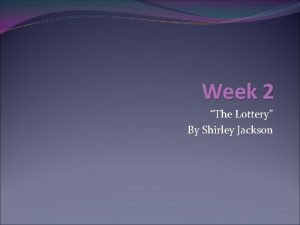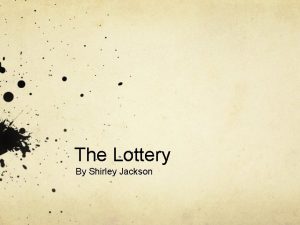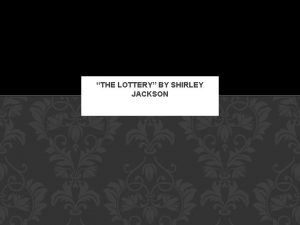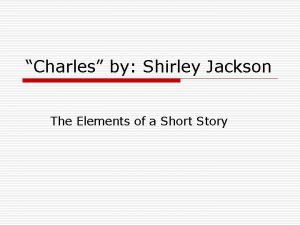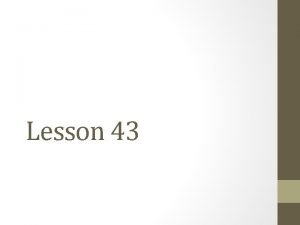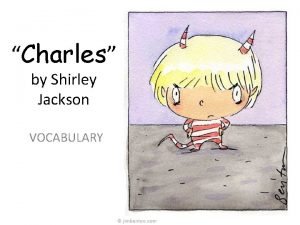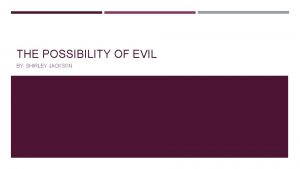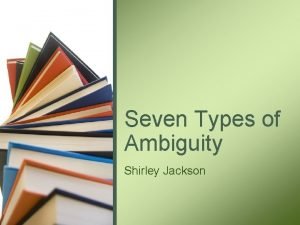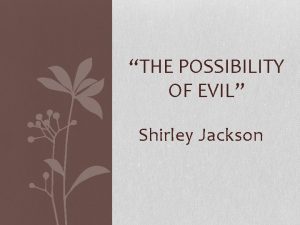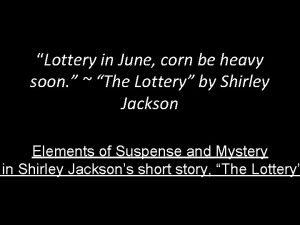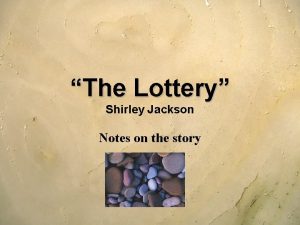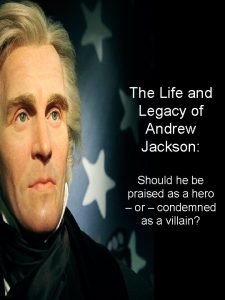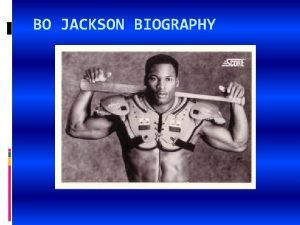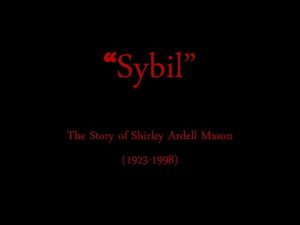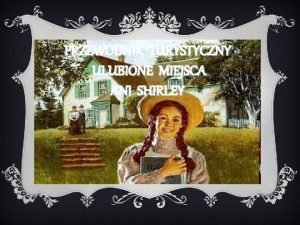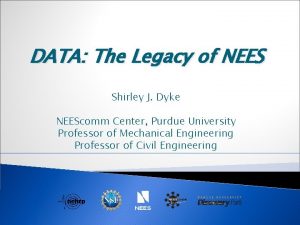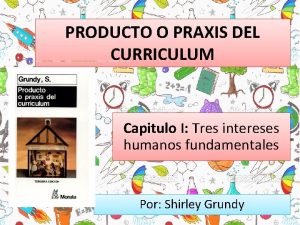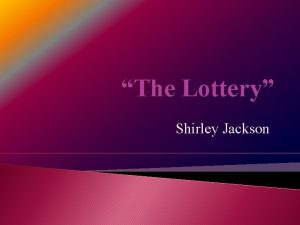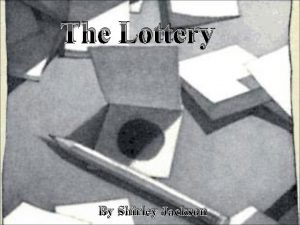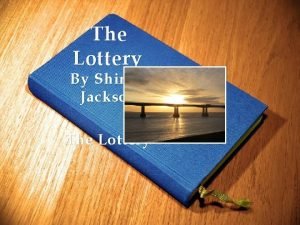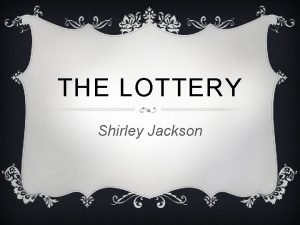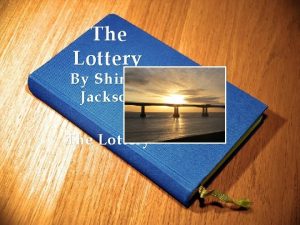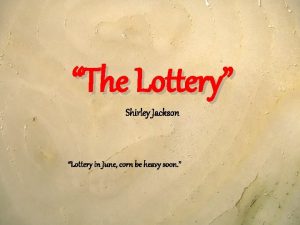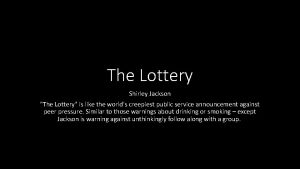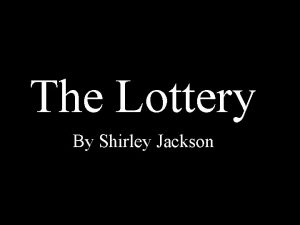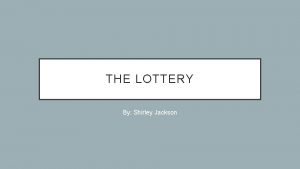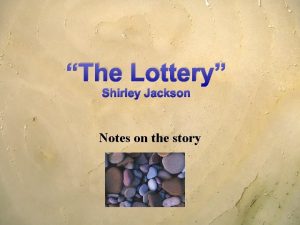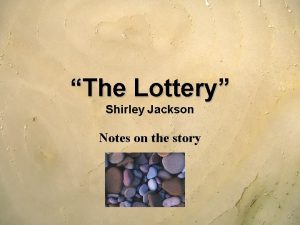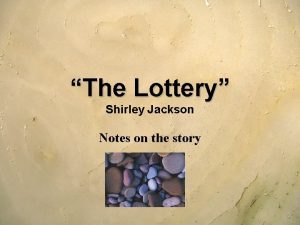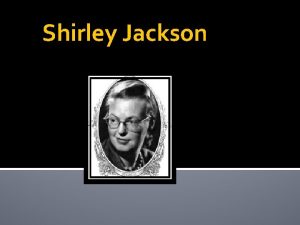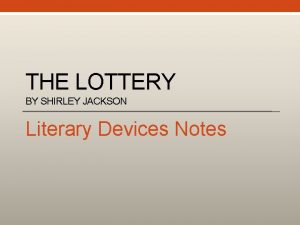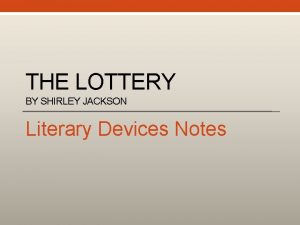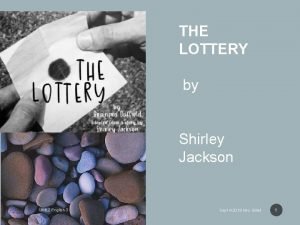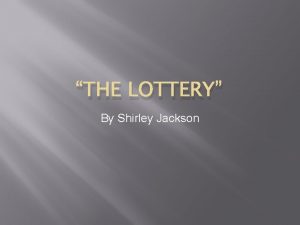The Lottery Shirley Jackson Notes on the story








































- Slides: 40

“The Lottery” Shirley Jackson Notes on the story

Focus Activity. Answer Aloud 1. What is a lottery? 2. What do you think about winning a lottery? 3. What would you expect to win? 4. Does a lottery give everyone equal chances?

Holding a Lottery… Everyone selects a slip of paper from the black box. No one (except me) should see what is on the paper. The winner will receive his/her prize later. Families?

Answer these questions, now! 1. 2. 3. 4. Was the lottery fair to all participants? Do you want to win the prize? Why do you want to win? What would be the best thing that you could win from this lottery?

Previewing “The Lottery” 1. Setting (time and place) – small town America, at the end of June. – What is happening at the end of June? 2. What other words does the word “lottery” bring to mind? Read the next passage on the following slides and make predictions about the story. Try to guess what the prize of the Lottery might be.

Passage One “The morning of June 27 th was clear and sunny, with the fresh warmth of a full-summer day; the flowers were blossoming profusely and the grass was richly green. The people of the village began to gather in the square, between the post office and the bank, around ten o’clock; in some towns there were so many people that the lottery took two days and had to be started on June 26 th, but in this village, where there were only about 300 people, the whole lottery took less than two hours, so it could begin at ten o’clock in the morning and still be through in time to allow the villagers to get home for noon dinner. ”

Suspense • Suspense is a literary device that authors use to keep their readers’ interest alive throughout the work. It is a feeling of anticipation that something risky or dangerous is about to happen.

Symbolism • A figure of speech where an object, person, or situation has another meaning other than its literal meaning. The actions of a character, word, action, or event that have a deeper meaning in the context of the whole story.

Ancient Ritual Sacrifice • In ancient Athens, Greece, Athenians believed that human sacrifice promised fertile crops. • Each year in ancient Athens, as one story goes, during the annual festival called Thargelia, citizens would stone to death a man and a woman selected for this purpose. • Death is thought to bring prosperity to the community • By transferring one's sins to persons or animals and then sacrificing them, people believed that their sins would be eliminated, eliminated a process that has been termed the "scapegoat" archetype • A similar ritual sacrifice occurs with Tessie Hutchinson. • This explains the village member's remark, “Lottery in June, corn be heavy soon. ”

Ritual without meaning • Because there has "always been a lottery“, the villagers feel compelled to continue this horrifying tradition. • They focus, however, on its gruesome rather than its symbolic nature, nature for they "still remembered to use stones" even after they have "forgotten the ritual and lost the original black box“. • The story may be saying that humanity's inclination toward violence overshadows society's need for civilized traditions.

“Let he who is without sin, cast the first stone" • “The Lottery” certainly alludes to Gospel of St. John, 8: 7, in which Jesus frees an adulterous woman, directing the scribe/Pharisee who is without sin to cast the first stone. No one throws stones at her. • Unfortunately, no one in “The Lottery” rebukes the powers so forthrightly as Jesus does in John 8: 7. Tessie becomes their scapegoat; she pays for their sins.

Male vs. Female • A conflict between male authority and female resistance is subtly evident throughout “The Lottery. ” • Early in the story, the boys make a great pile of stones in one corner of the square, while the girls stand aside talking among themselves, looking over their shoulders at the boys. • When Tessie draws the paper with the black mark on it, Tessie does not show it to the crowd; instead her husband Bill forces it from her hand holds it up. up

Women’s roles • Tessie Hutchinson defies the concept of the passive and selfless woman • Tessie's actions are decidedly unlike the behavior expected of the ideal wife and mother in the era. Tessie is hardly self-sacrificing. • She even jeopardizes her married daughter by suggesting that she join the Hutchinson family in the final lottery drawing.

Women vs. Women • At the beginning of the story, the girls stand together watching the boys gather the stones, but as those girls become women, the involvement in marriage and childbearing that the lottery encourages pits them against one another, blinding them to the fact that all power in their community is male. • A most grievous betrayal of another woman occurs when Tessie turns on her married daughter and attempts to jeopardize her safety. • Jackson emphasizes women's turning against one another, too, through her pointed depiction of the brutality of Mrs. Delacroix and Mrs. Graves in setting upon Tessie.

Mob violence • The heinous actions exhibited in groups (such as the stoning of Mrs. Hutchinson) do not take place on the individual level, level for individually such action would be deemed "murder. " • On the group level, people classify their heinous act simply as "ritual. " • When Mrs. Hutchinson arrives at the ceremony late, she chats sociably with Mrs. Delacroix. Nevertheless, after Mrs. Hutchinson falls victim to the lottery selection, Mrs. Delacroix chooses a "stone so large" that she must pick it up with both hands. • Whereas, on the individual level, the two women regard each other as friends, on the group level, they betray that relationship, satiating the mob mentality.

Symbolism • Stones are a universal symbol for punishment, burial and martyrdom: martyrdom they indicate a morbid ceremony. • Chips of wood: now discarded for slips of paper, suggest a preliterate/ancient origin, origin like the ancient sacrificial rituals for crops. • The setting: no specific name/place indicates this is anytown, USA; USA the contrast of the town with the ritual helps build suspense • Square: (village square) may represent the four corners of the earth—earthly opposed to heavenly; humancreated as opposed to natural; boxed in; concealed.

Symbolism • Black: the color for death, death mourning, mourning • • • punishment, punishment penitence in western civilization. The black box used to draw lots and the slip of paper with a black mark pointing out the 'winner' are mentioned too frequently to be coincidental. Black box: coffin? Evil secret hidden away? Black spot on paper: sin? A “black mark” on one’s record is negative; black mark: unclean?

Symbolism: Names • Tessie Hutchinson: Most likely an allusion to Anne Hutchinson (1591 -1643), ( American religious enthusiast who founded the Puritan colony of Rhode Island. She had new theological views which opposed her to other ministers. After a local trial banished her she was tried before the Boston Church and formally excommunicated. Anne and fifteen of her children were subsequently murdered by the Indians in 1643. • The parallelism between her story and Tessie's is clear: to her, excommunication meant spiritual death just as to Tessie being cast out from the group = death.

Symbolism: Names • Tessie Hutchinson: • Anti-ritual Ann Hutchinson held that neither church nor state was needed to connect a believer to his or her God. (In the end, Tessie rejects the lottery ritual, saying “it isn’t right. ”) • Tessie, diminutive for Theresa, derives from the Greek theizein, meaning “to reap”, or, if the nickname is for Anastasia, it will translate literally “of the resurrection”. (sacrifice for sins; contrast with Delacroix—“of the cross. ”)

Symbolism: Names • Delacroix (“of-the-Cross”) • vulgarized to Della-croy (no longer truly of the cross) • Some critics suggest that Mrs. Delacroix represents the duality of human nature: nature she is pleasant and friendly on the outside, but underneath she possesses a degree of savagery. • Cross has many connotations crossroads (faced with 2 directions); to cross something off; off to be angry; angry to cross over or to pass by; by pass from one side of to the other; other to oppose, oppose as in crossing one’s path; a burden; burden combination of 2 elements; elements To make or put a line across; across To betray or deceive, deceive double-cross…

Symbolism: Names • Summers: the season of summer is associated with youth, strength, growth, prime of life, warmth, leisure, prosperity, happiness, blooming, blossoming • Mr. Summers is the head of the coal business, which could symbolize close contacts with the underworld, evil; lurking just beneath the surface. • Coal is earthly (as opposed to heavenly); black; formed in the process of many years (long-term process); formed from compressed, decaying matter; early chemistry used a black spot to symbolize coal. • Marxist critics point out how Mr. Summers, who would have been one of the wealthier citizens, leads the lottery— those with money control the people’s activities.

Symbolism: Names • Graves : the obvious grave = place of entombment/death • Mr. Graves quietly assists Mr. Summers, with “Graves” hinting at a dark undertone • Grave = serious; serious hints that the lottery may not be a frivolous contest (“Mr. Graves said gravely”) • Critics have said that Jackson creates balance by juxtaposing Mr. Summers and Mr. Graves to share in the responsibilities of the ritual: Life brings death, and death recycles life.

Symbolism: Names • Adams : reference to the first man, the first sinner • While he seems to be one of the few who questions the lottery when he mentions that another village is thinking about giving up the ritual, he stands at the front of the crowd when the stoning of Tessie begins. Like the biblical Adam, Adams goes along with the sin; he follows others in their evil.

Symbolism: Names • Old Man Warner: Resistant to change and representing the old social order, he warns about how important the event is to the survival of the village. • Old man Warner is 77 years old the number 7 has many connotations, but one common connotation is that 7 is lucky …he has been lucky to avoid the lottery so many times.

Symbolism: Names • Martin : associated with Mars, the Roman god of • • • fertility and war. The following are just FYI: St. Martin: Patron of drunkards, to save them from falling into danger. (The origin came from St. Martin’s day coinciding with the feast of Bacchus, god of wine. ) St. Martin’s goose. The 11 th of November, St. Martin’s Day, was at one time the great goose feast of France. The legend is that St. Martin was annoyed by a goose, which he ordered to be killed and served up for dinner. He died after eating dinner, and a goose has been ever since “sacrificed” to him on the anniversary. St. Martin’s bird is the raven, raven long associated with death and departed spirits

Symbolism: Names • Dunbar: breaking this name down into its 2 syllables, one can come up with: • 1. dun – to treat cruelly; or a dull, brownish gray color • 2. bar - Something that impedes or prevents action or progress; relatively long, straight, rigid piece of solid material used as a barrier, support, or fastener; A standard, expectation, or degree of requirement;

Literary Analysis

Historical Context • After World War II America experienced a trend toward general social conformity. • People tended to imitate those around them rather than follow their own separate paths. • Encouraging this conformity was the spread of television, television which broadcast the same set of images to Americans scattered through the country. • Meanwhile, patriotic rhetoric dominated the public mood in politics. Fears about fascist dictatorships and communism, issues that had been highlighted by the warinduced paranoia and suspicion among seemingly peaceful American communities. • In the story, the townspeople are swept away by the tide of conformity, and the lottery goes ahead as always.

Foreshadowing… • Setting is a peaceful village in summer; readers expect the lottery to be a positive experience • Some of the boys create a "great pile of stones in one corner of the square. " • The men of the village arrive they stand away from the stones, joke quietly, and smile instead of laugh. • Since the lottery is to take only two hours, the villagers plan to be home in time for lunch. (how can they eat after this? ) • Mr. Summers, a cheerful man who conducts the lottery ceremony, sets the tone of the event with both his name and his casual behavior. • The lottery takes place every year when the nature cycle peaks in midsummer, a time usually associated with joyfulness.

Historical Context • By 1943 news of the Nazi concentration camps had finally reached America. • A number of Americans responded with horror and concern that communities could have stood by and silently allowed the Holocaust to occur • Jackson hints at a similar situation in her story when the townspeople are unable to fully question or prevent the brutal lottery practice.

Historical/Sociological Context • During World War II, Jews and other targeted groups were torn from their communities and sent to their death while the world stood by in silence. • In “The Lottery, ” Tessie is similarly suddenly ostracized from and killed by members of her own community. • A few of the townspeople disagree with the ritual, but they merely mutter their displeasure under their breath, afraid to speak out more boldly against the practice. • Not only do humans blindly perpetrate evil, the story tells us, but they are also capable of closing their eyes to and even participating in terrors that occur in their midst.

POV: rd 3 Person Objective • There is very little conflict in the story—only Tessie’s objections present any conflict at all. • At the end of "The Lottery, " the reader discovers with horror what is about to happen, but the story ends with the casting of the first stones. Jackson prefers to leave the gruesome details to the reader's imagination. • The conflict occurs within the reader as the reader notes foreshadowing in the story with growing uneasiness

What is irony? Review? • The use of words to convey the opposite of their literal meaning; a statement or situation where the meaning is contradicted by the appearance or presentation of the idea. • Three kinds of irony are commonly recognized: – Verbal irony is a figure of speech in which the intended meaning of a statement differs from the meaning that the words appear to express. – Situational irony involves an incongruity between what is expected or intended and what actually occurs. – Dramatic irony is an effect produced by a narrative in which the audience knows more about present or future circumstances than a character in the story

Irony Activity • Draw a vertical line down the middle of a sheet of paper, making two columns. • The left column will contain examples of irony, and the right column will contain an explanation of what makes that example ironic. – One of the first items in the left column might be from the setting: the flowers are "blossoming profusely and the grass [is] richly green. " – This is ironic because no one would expect something awful to happen on a day like this: the imagery sets the reader up to expect happy events.

Irony Activity Examples of Irony • Setting: the flowers are "blossoming profusely and the grass [is] richly green. ”. Why is it ironic • This is ironic because no one would expect something awful to happen on a day like this: the imagery sets the reader up to expect happy events.

Irony Examples • Have students work individually, in pairs, or in small groups to identify examples of irony throughout the story. Once they are done, point out to them any examples they may have missed.

Discussion Questions 1. What preparations were made for the lottery? 2. Cite examples of foreshadowing that hints at what is going to occur? 3. What paraphernalia was used in the lottery? 4. Why, according to the story, is the lottery carried on? 5. “The Lottery” is obviously not a realistic story. So, what points are being made? 6. Guess what the possible prize for the Lottery could be if it is held in all of the neighboring towns.

Themes • Not all rituals are beneficial, positive or civilized • Acts of violence, hatred, murder are not acceptable just because many people participate • Traditions and rituals should be questioned; group mentality can be harmful • People are not all good or all evil but a mixture of both. • Many more ideas/themes can be applied to “The Lottery”

“The Lottery”: More than you expected, right…?

“The Lottery”: More than you expected, right…? End of presentation. (Finally)
 The lottery shirley jackson questions
The lottery shirley jackson questions The lottery shirley jackson questions
The lottery shirley jackson questions The lottery by shirley jackson theme
The lottery by shirley jackson theme Symbolism in the lottery by shirley jackson
Symbolism in the lottery by shirley jackson Literary devices in the lottery by shirley jackson
Literary devices in the lottery by shirley jackson What is the resolution of charles by shirley jackson
What is the resolution of charles by shirley jackson Plot diagram the lottery
Plot diagram the lottery The lottery sacrifice
The lottery sacrifice The day my son laurie started kindergarten
The day my son laurie started kindergarten The possibility of evil characterization
The possibility of evil characterization Shirley jackson seven types of ambiguity
Shirley jackson seven types of ambiguity Possibility of evil shirley jackson
Possibility of evil shirley jackson Www.tibu
Www.tibu What does lottery in june, corn be heavy soon
What does lottery in june, corn be heavy soon What does the black dot symbolize in the lottery
What does the black dot symbolize in the lottery The life and legacy of andrew jackson
The life and legacy of andrew jackson Bo jackson early life
Bo jackson early life Cube wisc
Cube wisc Shirley cvc
Shirley cvc Shirley ardell mason art
Shirley ardell mason art Cornelia wilbur
Cornelia wilbur Jezioro lśniących wód
Jezioro lśniących wód Shirley d'sa
Shirley d'sa Shirley hills primary
Shirley hills primary Neeshub
Neeshub Shirley toulson
Shirley toulson Shirley kavanagh
Shirley kavanagh Shirley heim middle school
Shirley heim middle school Shirley heim middle school
Shirley heim middle school Shirley lerner
Shirley lerner Grundy shirley
Grundy shirley Dr shirley wray
Dr shirley wray Shirley heim middle school lunch menu
Shirley heim middle school lunch menu Shirley heim middle school lunch menu
Shirley heim middle school lunch menu Shirley phan
Shirley phan Shirley chilet cama
Shirley chilet cama Shirley gaw
Shirley gaw Shirley gaw
Shirley gaw Shirley bloom
Shirley bloom Lida zheng
Lida zheng Sybil dorsett
Sybil dorsett
